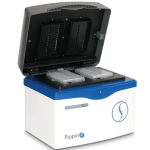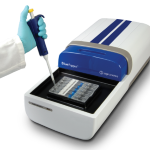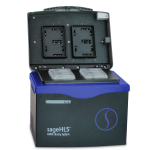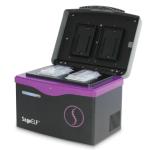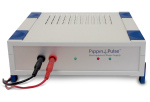Comparison of single-molecule sequencing and hybrid approaches for finishing the genome of Clostridium autoethanogenum and analysis of CRISPR systems in industrial relevant Clostridia
March 2014
Authors:
Steven D Brown, Shilpa Nagaraju, Sagar Utturkar, Sashini De Tissera, Simón Segovia, Wayne Mitchell, Miriam L Land, Asela Dassanayake, and Michael Köpke
Info:
Scientists generated a closed, high-quality genome sequence for a Clostridium autoethanogenum strain capable of fermenting CO, CO2, and H2 into biofuels or industrial chemicals. They used BluePippin to collect fragments 4 Kb and greater for sequencing on the PacBio® platform. Among novel findings was the discovery that the organism has a CRISPR system, which may make it more amenable to use in biotechnology than closely related strains without that system.
Citation:
Biotechnology for Biofuels 2014, 7:40
Comprehensive profiling of the vaginal microbiome in HIV positive women using massive parallel semiconductor sequencing
March 2014
Authors:
Adam Ameur, Tracy L. Meiring, Ignas Bunikis, Susana Ha¨ggqvist, Cecilia Lindau, Julia Hedlund Lindberg, Inger Gustavsson, Zizipho Z. A. Mbulawa, Anna-Lise Williamson and Ulf Gyllensten
Info:
Researchers at Uppsala University, Sweden, along with the University of Cape Town and the National Health Laboratory in South Africa, examined co-infections in 20 HIV positive women with a rapid detection sequencing method using rolling circle amplification and the Ion Proton platform. The authors indicate a more comprehensive detection when compared to existing genotyping methods, with the added benefit genomic information being collected. The BluePippin was used to size select samples for Proton template generation.
Citation:
Scientific Reports 4:4398
Simultaneous Rapid Sequencing of Multiple RNA Virus Genomes
March 2014
Authors:
John D. Neill, Darrell O. Baylesb, and Julia F. Ridpatha
Info:
Researchers at the USDA in Ames, Iowa, apply NGS to simultaneously sequence ten genomes of archived viruses from a single pooled sample, with the goal of studying viral evolution to facilitate vaccine design. Pippin Prep was used to size select the library pools prior to Ion Torrent sequencing.
Citation:
Journal of Virological Methods (2014)
SASI-Seq: sample assurance Spike-Ins, and highly differentiating 384 barcoding for Illumina sequencing
February 2014
Authors:
Michael A Quail, Miriam Smith, David Jackson, Steven Leonard, Thomas Skelly, Harold P Swerdlow, Yong Gu, and Peter Ellis
Info:
In this paper, scientists from the Wellcome Trust Sanger Institute and Frederick National Laboratory for Cancer Research describe Sample Assurance Spike-In sequencing, or SASI-Seq. The protocol adds uniquely barcoded amplicons to samples prior to library prep and sequencing; these barcodes allow users to deconvolute samples that get mixed up or to spot cross-contamination issues. They used Pippin Prep to test barcode robustness through the size selection process, finding that barcodes were not affected.
Citation:
BMC Genomics, 15:110
Glutamine methylation in histone H2A is an RNA-polymerase-I-dedicated modification
January 2014
Authors:
Peter Tessarz, Helena Santos-Rosa, Sam C. Robson, Kathrine B. Sylvestersen, Christopher J. Nelson1, Michael L. Nielsen and Tony Kouzarides
Info:
The authors describe a new class of histone modification, methylation of glutamine, occurring on yeast histone H2A. The data suggests that this is the first histone epigenetic mark dedicated to a specific RNA polymerase. Pippin Prep was used to size select ChIP seq libraries prior to Illumina sequencing.
Citation:
Nature, 505 (23) January 2014
